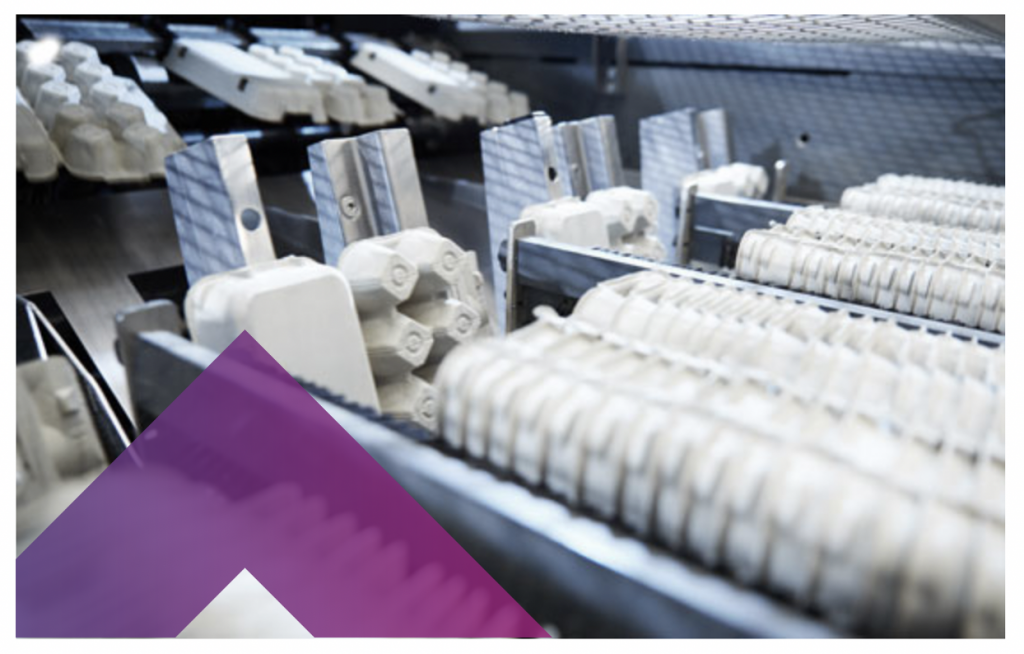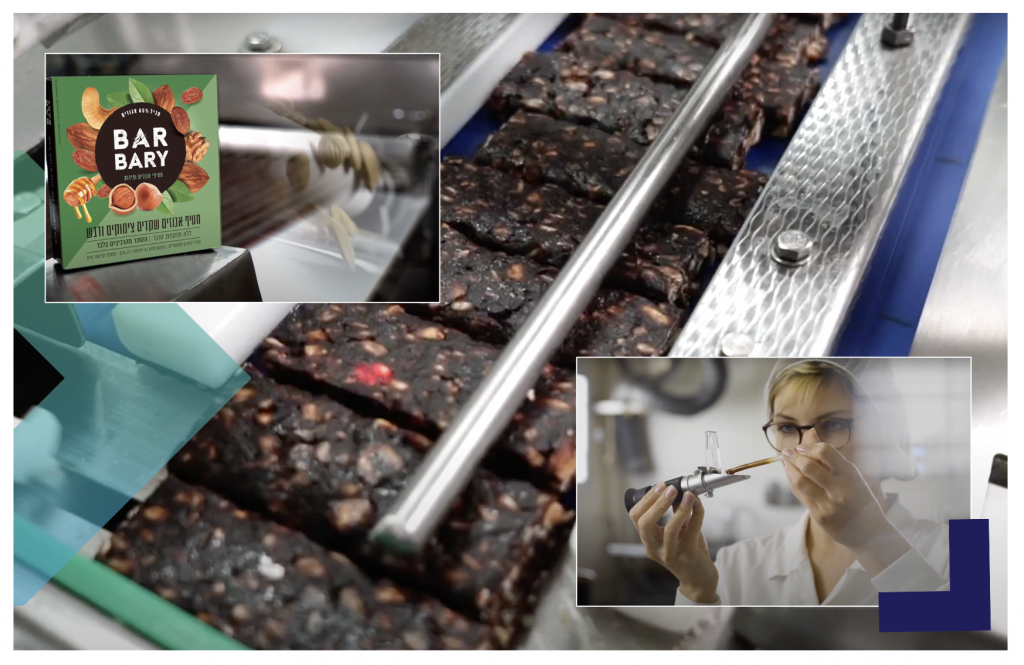Innovative advanced mechanization sometimes makes all the difference between a leading profitable company and yet another company producing a similar product. Advanced mechanization developed by two Israeli manufacturing companies with the assistance of the Israel Innovation Authority, provides them the advantage required to prosper in the competitive markets in Israel and overseas
During March-April, when the first wave of the COVID-19 pandemic was at its peak and the shortage of eggs was felt in almost every store, the cardboard egg cartons were the focus of public opinion. Normally, Hartmann-Mai – the only Israeli-located manufacturer of egg packaging made of recycled paper – is responsible for the daily production of hundreds of thousands of units of egg packaging for two billion eggs a year. The veteran company, that was bought by the global Hartmann corporation in 1999, is a publicly traded company on the Denmark stock exchange. The company is considered the world’s largest egg packaging manufacturing consortium and owns factories in many countries including Brazil, Argentina, Denmark, Croatia, Hungary, Canada, and the US.
“The company’s basic technology for manufacturing egg packaging has been in existence since 1917”, says Ronen Shriki, the CEO of Hartmann-Mai, who by profession is an accountant and holds a graduate degree in law. The main raw material used in the production process is recycled paper, and the process itself is sequential, in other words, each step is entirely dependent on the preceding stage of the process. It’s a very complex process that takes about 20 minutes – from raw materials to finished product. Any break in the process, caused primarily by shortage in manpower due to the Corona pandemic, causes disruption and delays. “When the scale of production is hundreds of thousands of items a day, this creates a significant shortage of egg packages”, he points out.
An Alert from the System
The mechanized manufacturing process developed by Hartmann-Mai helps meet the demand for egg packaging from recycled paper. “The advanced mechanization has enabled the company to achieve a high level of standardization in the mechanized manufacture process”, Shriki emphasizes. “The mechanized control system allows the company to monitor the process without the need to be physically present on site. We supervise each stage of the process in real time – identifying the pool levels, the degree of viscosity, the tap flow, and many other parameters. This enables us to ensure that everything is operating properly, and any malfunction is identified by the remote innovative mechanization that then issues an alert. This is a significant improvement in the production process.”
As far as Hartmann-Mai is concerned, this is a technological step-up. The advanced mechanization enables to open a tap or initiate the flow of a substance via the computer. In addition, the foreman or operator receives an SMS alert from the system of any parameter that needs checking. “From a situation in which we needed to physically look for the malfunction with a torch, we have now reached the point where the system contacts and alerts us”, Shriki describes.
Manufacturing Advantage and Differentiation
The success of Hartmann-Mai’s innovation process and of the advanced mechanization’s application was made possible thanks to the support of the Innovation Authority and the Contel corporation – a Petach Tikva company providing automation and control solutions. According to Ronen Shriki, the Innovation Authority’s R&D Preparatory Program significantly helped the company to focus the process by providing professional advice, guidance, and precise specification of its needs. The connection with Contel, that built the HMI systems, was also established with the help of the Innovation Authority. “These systems are what makes us unique and enable us to differentiate ourselves from the competitors”, he states.
The products that Hartmann-Mai packages are unique to the market. Eggs are extremely fragile, and the major challenge is to keep them whole throughout the various stages of production. Hartmann-Mai’s solution is to manufacture a flexible cardboard mold that protects the eggs and keeps them whole. Furthermore, the eggshell is not opaque, and condensation can form in the transition between the different points of the production line that causes bacteria to penetrate the egg. The cardboard absorbs the condensation and significantly reduces the penetration of bacteria into the egg.

According to Ronen Shriki, the innovative mechanization dramatically increased output, contributed markedly to the workers’ professionalization, and enhanced their quality of life. “Before we began working with the new mechanization, every stop and restart in the production process required physical intervention. Today, every worker at the operator’s station receives specific training and learns how to operate the computerized process. During the past year, we even introduced another innovative feature into the process – the use of a robot. Until then, the workers on each shift stacked hundreds of bundles of egg packages on pallets. Today, the robot lifts and orders the bundles, while the workers operate it and focus on quality control.”
Part of the company’s vision in Israel, one that also stems from that of the parent company, is environmental sustainability. Hartmann-Mai was one of the first companies in the world to begin recycling, before everyone else realized its importance. As far as the company is concerned, recycling is a paramount value. “We only use eco-friendly materials and regard environmental sustainability as a calling – not just with regard to the final product but also to the work process itself. This is evident in the many international awards that the company wins every year for its contribution to environmental sustainability”, says Ronen Shriki.
“The world of manufacturing is undergoing a technological revolution. Making the transition to smart industry and advanced mechanization are vital to increase chances of survival and to create a competitive differentiation”, says Dr. Malka Nir, Head of the Innovation Authority’s Advanced Manufacturing Division. “We encourage advanced industry in Israel at the Innovation Authority by promoting innovation processes aimed at increasing productivity in the manufacturing industry. The connection between factories and technology experts in fields of Industry 4.0 allows factories to assimilate advanced methods and to connect to technological trends in the field.
From Manual Labor to an Advanced Machine for Manufacturing Snacks
The used of advanced mechanization is also a high success factor in the food manufacturing industry. ‘Tivit – Products from Nature’ is a privately owned Israeli company that manufactures health snacks. The company, founded in 2001, focuses on manufacturing sugar free and gluten free sesame, peanut, and sunflower snacks. The snacks were packaged in special zip-lock bags that preserved freshness and which could be closed and re-opened later to finish eating the rest of the snack. The company’s founder, Ilan Peretz, says that Tivit’s uniqueness is that the company’s snacks are manufactured without gluten or added sugar, that are even sold as individually wrapped finger snacks (bars) and not in a bag, while its competitors use both sugar and gluten.
“When founding the company, I made a very early decision to focus on manufacturing a healthy snack – without compromise”, Peretz says. “In the first year, we achieved significant sales growth and began to think about how to progress – whether to continue manufacturing in the company’s small factory in Holon or to move to a larger factory in order to develop further and produce additional products”. Tivit chose the second option, and the company realized that there was a need for an advanced manufacturing machine for the snacks in order to create a significant advantage over the competitors. Until then, the company had employed a manual method to cook the product mass, pour the mixture on to a table, roll it like a cake, and cut it with a knife.
When Peretz despaired of his search overseas for suitable advanced machinery at an affordable price, he decided to look for Israeli companies who could build the machine he wanted. The machine needed to “learn” and be able to take in the raw material mass and produce a snack-bar in a continuous process without human intervention. “The development process took a very long time and was accompanied by many technical challenges”, says Peretz, “we learned the hard way, that there is a big difference between trial runs of the production line in the workshop for short times and scaling up to continuous production during a whole shift. Although some thought that this was a hopeless attempt, it was clear to me that without advanced machinery, the company had no future”.
In 2002, the company moved to a larger factory in Ashkelon where it developed and installed its first semi continuous production line. A year later, the line was already manufacturing all the company’s products, with meticulous care for the health aspect and while using only the best quality raw materials.

Smart Technology Opens Doors to New Markets
In 2005, a new partner – Rami Offer – joined the company as an equal partner. Offer, a food technologist, had previously worked as R&D manager for Telma-Unilever. At this stage, the company began focusing on manufacturing snack bars in close collaboration with the Innovation Authority. This collaboration helped Tivit develop a new line for manufacturing all-natural fruit and nut-based snack bars. “The Authority accompanied us throughout the entire process”, emphasizes Peretz, “including a professional evaluator who examined the different stages of the development process and helped us put them in focus, as well as assisting us with financial grants.”
The entry into the world of all-natural snack bars expanded the range of Tivit’s products and today the company develops snacks with cereal, nuts, and dates, and even a series of snacks under the Barbary brand, that contain 100 percent natural vegan ingredients – without gluten or added sugar and preservatives. The company also manufactures for the “free” and “Neot Semadar” brands.
The smart company’s technology and advanced mechanization process opened the door to new markets. Today, the company exports primarily to the United States and Switzerland and is preparing to start selling the snacks online.
These innovative developmental steps proved themselves to be vital for the company’s growth and enabled it to remain efficient and unique in a highly competitive field with numerous competitors from Israel and overseas. “We grew by more than 50 percent in 2019 compared to the previous year”, and in the first quarter of 2020, we grew by a further 30 percent. Naturally, the employees also benefitted from the process says Peretz. “But this growth would not have been possible if we had not upgraded and automated our production process. Even though production capacity increased dramatically with the introduction of the advanced mechanization, we have maintained our existing workforce, and even increased it.
“Tivit’s vision is to continue growing and developing. The Innovation Authority’s support for a new project we began in Jan 2020, will allow us to launch a new innovative category of products in early 2021. The fact that my partner is a food technologist is a great advantage for the company and enables the rapid development within the factory. In our field, if you don’t produce something new, you simply cannot compete with similar companies worldwide”, Peretz concludes.
